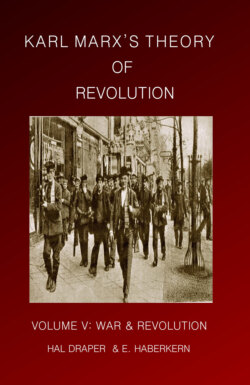Читать книгу Karl Marx’s Theory of Revolution Vol V - Hal Draper - Страница 16
На сайте Литреса книга снята с продажи.
3. A Nation That Oppresses Others Cannot Itself Be Free
Оглавление<< Index will generate here >>In 1848, the NRZ emphasized throughout that the main obstacle to German unification and self-determination was not foreign militarism but the slavish political traditions of the Germans themselves. Their collaboration in the oppression of other peoples was what kept them chained to their own rulers. One chain could not be broken without breaking the other.
Within a month of the paper’s first appearance,6 Engels recounted in detail the role of Germans as mercenaries, especially in the pay of England, from North America to Greece and Italy, but, he concluded:
The blame for the infamies committed with the aid of Germany in other countries falls not only on the governments but to a large extent also on the German people. But for the delusions of the Germans, their slavish spirit . . . the German name would not be so detested, cursed and despised, . . . Now that the Germans are throwing off their own yoke, their whole foreign policy must change too. Otherwise the fetters with which we have chained other nations will shackle our own new freedom, which is as yet hardly more than a presentiment. Germany will liberate herself to the extent to which she sets free neighboring nations.7
Engels proceeded to argue that things were getting better. Chauvinist propaganda, “the turgid phrases proclaiming that German honor or German power is at stake” are no longer effective. The article concluded by turning the argument around. If freedom at home is incompatible with oppression abroad a revolutionary foreign policy also requires a revolutionary domestic one.
. . . we must achieve a really popular government, and the old edifice must be razed to the ground. Only then can an international policy of democracy take the place of the sanguinary, cowardly policy of the old, revived system. How can a democratic foreign policy be carried through while democracy at home is stifled.8
What did the NRZ mean by a “democratic foreign policy”? The clearest editorial statement of what was meant came very early on, little more than a month after the paper began publishing. The occasion was the uprising in Prague.9
The right in Germany attempted to portray this rising, which was brutally crushed by Austrian troops under Prince Alfred zu Windischgrätz, commander of the Imperial forces, as an anti-German nationalist uprising. There were even hints and rumors that the Russians were behind the whole thing. Leading the campaign were German speaking inhabitants of Bohemia organized in groups like the League to Preserve German Interests in the East. The NRZ devoted some space to reports from the scene by German supporters of the uprising. According to these reports the rising was supported by both German and Czech democrats fighting for “the preservation of Bohemia’s independence and the equal rights of both nationalities”;10 the opposition came from the defenders of the old order and the defenders of German minority rights were simply stalking horses for the right with no significant support. How accurate were these reports? Contemporary sources as well as modern historians tend to endorse this description of the Czech national movement at this stage of the revolution.11 The uprising was, apparently, based on the largely Czech-speaking lower class with the energetic leadership of students.
Both Czech nationalists and German chauvinists reacted to this class threat by backing off from the uprising.12
In short, modern historians generally tend to support Engels view of the situation. But that is not really the relevant question if what we want to know is: What was the foreign policy of the NRZ? If the paper did exaggerate for polemical purposes the degree to which the uprising was a social rather than a national revolution that is significant in itself. Political propaganda in this kind of situation is not simply an impartial commentary on events. It is an attempt to intervene, to strengthen one side or the other. The NRZ editorial on the report from Prague concluded that “German reaction is seeking to rouse a narrow-minded nationalism just as in Posen and in Italy, partly in order to suppress the revolution in the interior of Germany and partly to train the soldiery for civil war.”13
Looking at the events in Prague from the perspective of the German revolution, the NRZ boasted that:
Despite the patriotic shouting and beating of the drums of almost the entire German Press, the Neue Rheinische Zeitung from the very first moment has sided with the Poles in Posen, the Italians in Italy, and the Czechs in Bohemia.14
The old regime “shaking in its foundations in the interior of Germany” sought to save itself by “calling forth a narrow-minded national hatred. Were the Germans to “crusade against the freedom of Poland, Bohemia and Italy” under the leadership of the very governments they were fighting at home? No, the editorial claimed:
Only a war against Russia would be a war of revolutionary Germany, a war by which she could cleanse herself of her past sins, could take courage, defeat her own autocrats, spread civilization by the sacrifice of her own sons as becomes a people that is shaking off the chains of long, indolent slavery and make herself free within her own borders by bringing liberation to those outside.
A modern editor would undoubtedly send the article back for revision or insert a transitional paragraph or two herself. In 1848, it wasn’t necessary. Everyone understood the connection between revolution at home and a war against the Holy Alliance.
